Saleh Malas|Yamen Moghrabi|Louay Rhebani
Many Syrian human rights groups have documented extensive violations of international humanitarian law and human rights in Syria carried out by the Syrian regime. The United Nations General Assembly, in December 2016, formed a mechanism, responsible for collecting and analyzing evidence related to serious offenses committed in Syria in order to be used in any future judicial proceedings before any court that may have the jurisdiction to hear such offenses.
The available information and data have not helped make progress in international efforts to bring justice to past and current international crimes within Syria because Syria is not a member of the International Criminal Court (ICC).
Therefore, if the Syrian government does not accept the court jurisdiction to consider the offenses it has committed in the past nine years voluntarily, the ICC’s Prosecutor would have to refer the situation in Syria to the Security Council to open an investigation there.
In 2014, Russia and China used the Veto power to object to a Security Council resolution that would have given the Prosecutor this jurisdiction. This veto prevented any steps ensuring the Syrian government’s real accountability in Syria or abroad, which led to more violations being committed.
In the shadow of the obstruction of international justice course for victims of human rights violations in Syria, the Syrian and European human rights groups have sought to investigate the violations and prosecute the perpetrators, to do a limited degree of justice.
Since 2015, the European continent has been the arena of human rights conflicts, which gathered the victims of torture in Syria with their executioners under the courts’ cellars. During this year, the trial’s file of many conflicting parties there developed with the starting of the world’s first trial about killing under torture and rape within the government’s detention facilities.
This year, the Netherlands announced its decision to hold the Syrian government responsible under international law for gross human rights violations, including torture in the Syrian regime’s detention centers and the use of chemical weapons in Syria. Syria has been informed of the decision by a diplomatic note.
Enab Baladi discusses in this file with Syrian rights activists the impact of these trials and legal movements on Syrian refugees in Europe on the one hand, and on the relationship of the European Union countries with the Syrian regime politically on the other one.
European powers take legal action against the Assad regime’s war crimes
Steps to face question of refugee deportation
Investigations and prosecutions led by European human rights organizations into war crimes pave the way to provide integrated legal frameworks to regulate asylum policies within the European continent.
These legal moves draw the judiciary and media’s attention to the violations in Syria and keep Europe’s asylum policymakers informed of the country’s ongoing events through legal clues.

A German court session in Koblenz to prosecute the two Syrian officers Anwar Raslan and Eyad Al-Gharib for committing a crime against humanity – 23 April 2020 (AFP)
Syrian journalist and human rights activist Mansour al-Omari stated in his interview with Enab Baladi that the trial of “Koblenz” in Germany, whose sessions have continued since last April, is considered a legal basis for the Syrian refugees there against any decision to return them to Syria.
Al-Omari justified his statement that the Koblenz trial emphasizes the regime’s use of torture against opposing Syrians and explains the methodology for random civilian arrests in Syria, which poses a danger to all Syrians.
According to Al-Omari, the asylum policymakers and implementers in Europe rely on several sources to assess the situation in Syria, including the United Nations, human rights organizations, and intelligence reports. While the Koblenz trial will constitute an additional source for asylum law and policymakers, it will not be definitive in protecting the refugees from the risk of deportation.
Meanwhile, Germany and Sweden’s ongoing legal efforts to investigate and prosecute individuals involved in alleged war crimes inside Syria are based on interviews with the relevant authorities in these two countries. This means that how refugees deal with the authorities and seek justice is vital to European countries dealing with such cases.
Due to the large numbers of Syrian asylum seekers and refugees in Europe, including victims and witnesses who were not available to the courts before, as well as some physical evidence and even some suspects, have become within reach of the German and Swedish authorities, according to the Human Rights Watch report issued In 2017, as the most stable places for Syrian asylum seekers in Europe, Germany and Sweden were the first two countries in which individuals for serious international crimes in Syria were tried and convicted.
In his interview with Enab Baladi, the director of the “Syrians for Truth and Justice” organization, Bassam al-Ahmad asserted that Germany’s trials paved the way for the authorities in several European countries to review the files of refugees involved in war crimes. Al-Ahmad said these prosecutions might make a considerable change and called on refugees with information to come forward.
Based on a post on the Danish Immigration and integration website dated 28 June, Mattias Tesfaye, the Danish Minister of Immigration and Integration, said that the Immigration Department must review the residence permits granted in Denmark for Syrian refugees coming from Damascus.
The Ministry of Immigration Integration in Denmark is working to expedite Syrians’ immigration cases to efficiently assess whether residency permits can be withdrawn from Syrian refugees coming from Damascus, which is a deemed a “safe area.”
Tesfaye pointed out that about 100 thousand refugees have already returned to Syria from surrounding areas, asserting that Syrians in Europe should return if circumstances allow.
He also pointed out that the “Danish Independent Refugee Council” had intervened in five Syrian refugee cases from the Damascus governorate, as they were not entitled to temporary protection since the “situation has become better,” as he put it.
This aside, Ibrahim Melki, the representative of the “Free Lawyers Syndicate in Europe,” called on the Syrian refugees to file lawsuits against Syrian war crime suspects. Lawyer Melki affirmed in an interview with Enab Baladi that he and a group of lawyers “are working to bring many of those involved in war crimes to trial in Europe.”
According to Melki, five European countries (Germany, Sweden, Spain, the Netherlands, and Norway) accept Syrian requests to bring cases before their courts, even if the suspect is outside their borders.
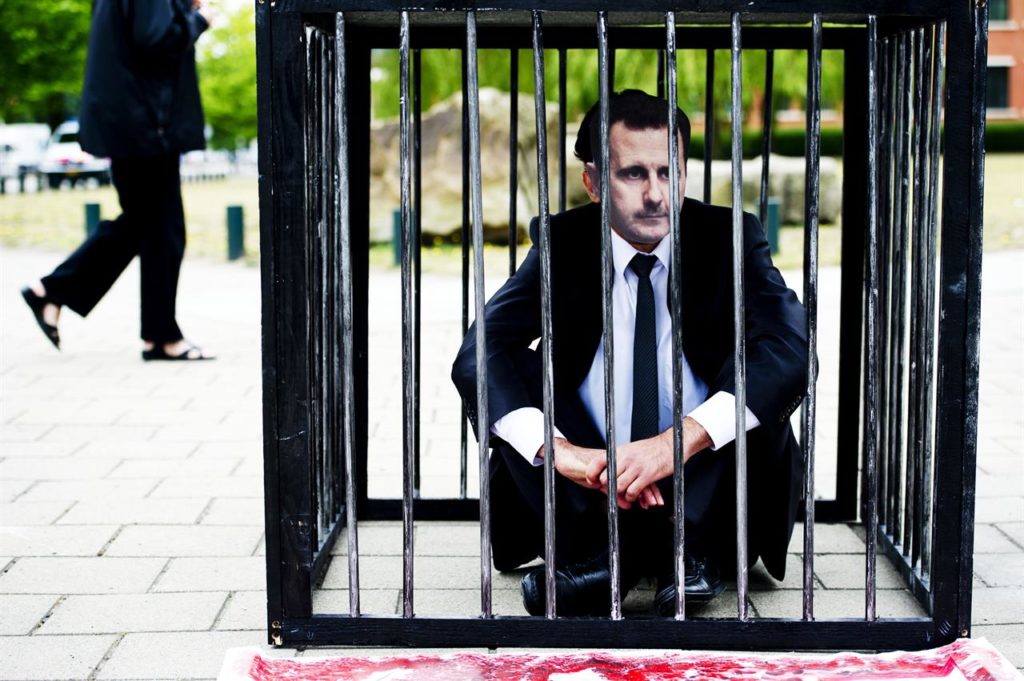
A protester wearing a mask of the President of the Syrian regime, Bashar al-Assad, sits on the ground inside the dock in front of the International Criminal Court in The Hague, western Netherlands – June 7, 2011 (ROBIN UTRECHT / ANP / AFP)
Trials form a reassuring factor for asylum seekers in Europe.
European trials investigating the crimes committed in Syria comprise an important factor in reassuring refugee victims and their families. Evidence that some suspects of human rights violations in Syria have been masquerading as refugees in Europe has been brought to light and, as a result of cases, have been brought before European courts.
However, according to the Amnesty International report, the vast majority of asylum seekers who have arrived in Europe from conflict zones over the past few years are legally seeking protection from the prevailing persecution, crime, and violence.
These trials have led to investigations of asylum seekers aiming to identify war criminals. Interrogating these individuals is an appropriate and necessary procedure to ensure justice for the crimes committed in Syria.
The prosecution of two former Syrian intelligence officials Anwar Raslan and Iyad al-Gharib, identifies suspected war criminals from genuine asylum seekers. During the trial sessions last May, the court heard the testimony of three witnesses and employees of the German Federal Office for Migration, where the witnesses were questioned in detail regarding Raslan and al-Gharib’s asylum procedures.
According to the Amnesty International report, the arrival of a small number of potential war criminals in Europe does not justify stigmatizing entire groups of asylum seekers or provoking racist or hate responses as these people seek to escape from grave human rights violations.
Documentation efforts, including the preservation of important potential evidence, will be ongoing, which may be essential for future domestic and international accountability processes. However, a judicial forum is still needed to handle the comprehensive prosecution of perpetrators who have committed war crimes in Syria.

Syrian Eyad al-Gharib before a German court in Koblenz, accused of committing a crime against humanity while he was an officer in the Syrian State Security Service at Al-Khatib Security Branch – 23 April 2020 (AFP)
The trials cannot be an “absolute safeguard” against the normalization of European political relations with the Syrian regime.
Muhammad al-Abdullah, the director of the Syrian Center for Justice and Accountability, regarded the trials currently taking place in the European Union against alleged perpetrators of war crimes to be an obstacle that prevents any political attempt by any European authority to normalize its relations with the ٍSyrian government as it had been before 2011.
During an interview with Enab Baladi, al-Abdullah said that these trials “will disturb the relationship between European countries and the Syrian regime, if European governments try to go towards normalization.”
According to al-Abdullah, if there is a real political desire in any European country in the future to restore its relationship with the regime in Damascus even only on the commercial level, the Syrian human rights file will not be an obstacle. Political settlements can circumvent judicial accountability. However, such restoration will place that country in an embarrassing position before some other European countries adopt the human rights file.
Al-Abdullah believes that normalization at different levels by some European countries with the Syrian regime is possible in political perception despite the existence of trials before their national courts, especially since there is a remarkable increase in the voices of some right-wing parties in European countries such as Austria and Denmark.
The policy of these parties focuses mostly on the economic interest in each case. Hence they regard Syrian refugees residing in their lands as a financial burden. Thus, refugees’ return from these parties’ countries would require the normalization with the Syrian government in return.
During a seven-day visit to Damascus in 2018, a German delegation promoted the idea of ending the manifestations of war and for citizens to live in peace. Christian Blix, head of the delegation and a member of the German parliamentarian, published a set of photos he had taken during his tour in Damascus’s streets, which he claimed were neighborhoods free of militarism.
“The trials are good, but they will not constitute a human right or political barrier forever. They might make the normalization process harder or raise some questions on its ethics, but it is not an absolute safeguard against normalization,” said al-Abdullah.
According to al-Abdullah, the benefit of the trial records lies in highlighting the plight of suffering, which is very important. However, this alone will not bring down the regime, as its actual impact on European countries’ political relations and the Syrian regime is limited.
Some of the cases pending before European courts are cases in absentia in which there will be no trials, like Germany and Spain, for example, do not allow trials in absentia. The “Koblenz” trial is unique because the accused individuals were present on German soil.
According to Abdullah, the regime will not hesitate to liquidate individuals wanted for trial by the judiciary in Europe and remove them from power in normalization deals commencing between EU countries and the regime. This would be on the condition that those lawsuits are filed against certain persons in return for the restoration of his political and economic relations with the European Union. Therefore, the human rights file should not be the biggest obstacle as states prioritize their political and security interests above human rights issues and ethics.
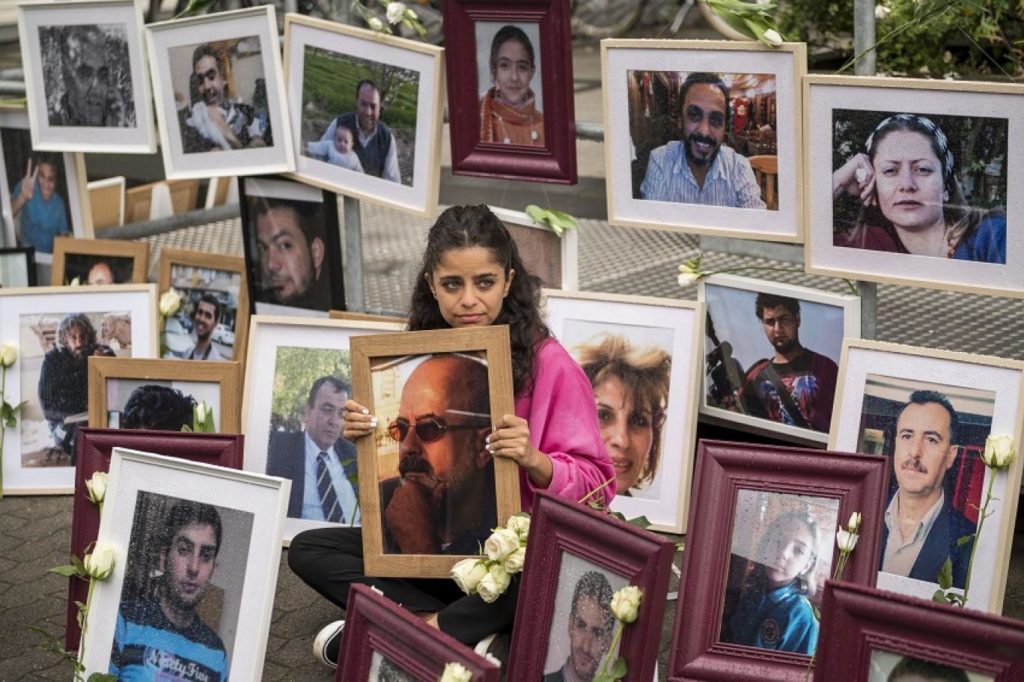
A Syrian activist Wafa Mustafa sits amongst photos of victims of the Syrian regime, holding a picture of her detained father, during a protest outside the trial of two former Syrian intelligence officers accused of committing crimes against humanity in Koblenz, western Germany – 4 June (Thomas LOHNES / AFP)
Stop the flow of refugees or return to the Syrian crisis?!
What are the benefits that Europe seeks to gain from the courts?
The European trials opened the gates for those who committed human rights violations, whether they are members of the Syrian regime or people who previously joined organizations classified as terrorist organizations and Syrian opposition members. This also raises the question of what benefits European countries will obtain from these trials.
Political return to the Syrian crisis
Prominent countries are present in the Syrian file both politically and militarily as there are Russian and American forces in Syria as well as regional countries, such as Turkey, which has observation posts in separate areas in northern Syria, and Iran, which is accused of sending military militias to fight alongside the Syrian regime forces.
These countries are also engaged in the Syrian file through the political tracks such as “Astana,” “Sochi” and “Geneva,” While the European Union is absent from the file and more preoccupied with the issue of refugees on its land and disputing over which country has taken its fair share of refugees.
The European Union registered its presence in the Syrian file through sanctions against the Syrian regime, individuals, and entities in contact with it militarily and economically.
Unlike the USA, Russia, and Turkey, the European Union doesn’t have any force power inside the Syrian territories, except for France, which is concentrated with the American forces in the east of the Euphrates areas.
The trials opened the door for the European Union to politically return to the Syrian crisis, especially with its insistence not to contribute to reconstructing Syria without a transitional political process referencing to the rule No. 2254, issued by the Security Council in December 2015. The fourth paragraph of which states: the Supporting of a Syrian-led political process, carried by the United Nations, that establishes, within six months, a fully organized rule that is inclusive and not based on sectarianism.
In early October this year, the German minister for foreign affairs Heiko Maas stressed that Germany would reject the reconstruction project in Syria without a “sincere” political process, which was also confirmed by the seven largest countries in the world (France, Italy, Germany, America, Japan, Britain, and Canada) in April 2019.
The Syrian crisis is subject to agreements between four countries: Turkey, Russia, Iran, and the USA, with a complete European absence. This encourages Europe to adhere to the trial file to create a presence within the Syrian file.
According to the Professor of International Law at Washington College in America University, Dia Ruwishdi, in his speech with Enab Baladi, the trials in Europe are attempting to prevent the legalization of the Syrian government, or even try to view its government as a “legitimate government.”
Consequently, Europe will place justice into the political arena to prevent any attempts to place the Syrian government into a legitimate status. This, according to Ruwishdi, is one of the political reasons that the public prosecution offices that receive the reports need financial and logistical support to move forward with the file, and that is not something that could be separated from the political aspect. Therefore, Europe’s steps in this area mean a change in the political field’s future, and there is political momentum to support these issues.
This being said, this does not mean that there are no European governments ready to recover their relations with the Syrian government. We see that the US position towards the Syrian government is more robust compared to the European stance, as the aforementioned “European position” is not yet consistent enough, and this matter is chiefly due to the refugee issue, according to Ruwishdi’s view.
It would seem that one of the reasons for the European Union’s political absence from the Syrian crisis is its possession of great economic coordination among its members, unlike the political coordination, as the Union consists of several governments in different countries, trying to take into account their interests in external fields, which affects the unanimity of the Union.
Germany is not alone in its human rights concerns in Syria, as the Dutch government has also announced that it is preparing to send a legal complaint against the Syrian government citing its “irresponsible acts and violence against human rights,” with the Syrian government retorting: “the Netherlands is the last country to talk about human rights.”
A statement by the Dutch government published on its official website on 18 September 2020 stated that it informed the Syrian regime, in a diplomatic note, of its intention to punish it for mass human rights violations committed against the Syrian people.
Minister of Foreign Affairs of the Netherlands, Stef Blok, said that the Syrian government did not hesitate to take any strict measures against its people by using torture methods, chemical weapons, and bombing hospitals, adding to that, the Netherlands seeks to obtain justice for the victims of these serious crimes, by “forcing the criminals to assume the responsibility.”
Consequently, the Netherlands and Germany instigate the other countries to implement similar steps to put extra pressure on the Syrian government and secure a role for them at the political level.
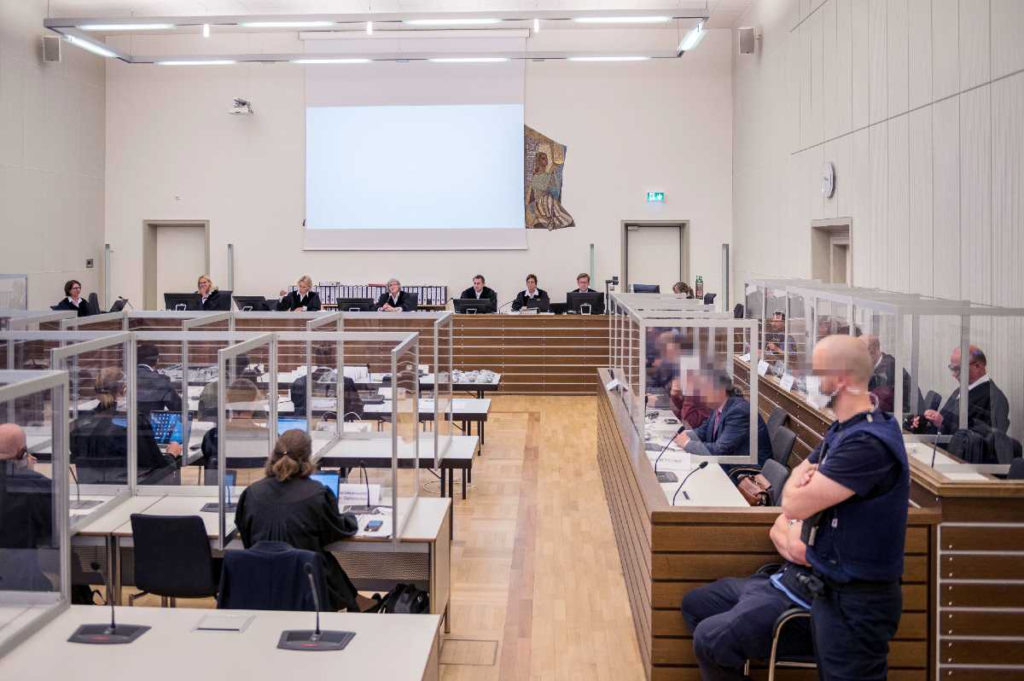
Presiding Judge, Anne Kerber sits in the Koblenz High Courtroom during the trial of two former Syrian intelligence officers accused of committing crimes against humanity in the first trial of its kind stemming from the conflict in Syria – 4 June 2020, in the city of Koblenz, western Germany (AFP / Thomas Lyons)
Many messages beyond European trials … One of is to refugees
Denying normalization with the Syrian regime and striving to return amid the scene of Syria’s events are not the only messages Europe seeks to deliver through the trials as of late. Yet the European Union, which is actually engaged in the refugees’ matters on its territory, sends extra messages to other parties.
Far-right groups in Europe, in addition to seeking to incite hatred, use these trials to apply pressure to their governments. It can be seen through such trials, according to Dia Ruwishdi, European governments are aiming to reassure their people that they are indeed trying to investigate the backgrounds of refugees and that those who have engaged in criminal acts and carried out such acts of violence will be held to account and have their day in court. Therefore, the government can be seen to be protecting its citizens with every possible means and measures. This, in itself, is hugely advantageous to European governments.
The second message being amplified here is directed at the migrants themselves, pointedly declaring that “if you committed a crime in the past, you would certainly be judged,” said Dia Ruwishdi.
The trial of the former Intelligence Officers of the Syrian regime, Anwar Raslan and Eyad al-Gharib, garnered a great media momentum and major coverage in international newspapers, which connote, according to Ruwishdi, the interest in “justice.”
Then again, this interest matches fears that the trials, on which Syrian victims rely for justice, will turn into a political bargaining chip.
According to Bassam Alahmad, Executive director at Syrians for Truth and Justice, the fear of this shift arises from the fact that political decisions can always precede justice.
However, Alahmad emphasized that transforming the trials into a pressure card or submitting them to political bargaining is not easy.
Recently, there was an opening of trial case files, but they were not complete. In other words, neither the victims nor the perpetrators were physically on European soil, indicated Alahmad. Furthermore, previous efforts around companies and individuals associated with the Syrian regime fought alongside ISIS or otherwise committed any other crime in Syria.
Face-saving trials
Politically, Europe did not submit anything to the Syrian file. Rather it failed in its venture into the political context of what Muhammad Abdullah, the Executive director at Syrians for Truth and Justice, believes. This comes down to the fact that Europe’s role was limited to hosting Syrian refugees and supporting and advocating human rights issues that Syria is afflicted with. But as for the political cause, the main reason for which the Syrians migrate in the first place, it was absent in European political fields.
Therefore, the European Union countries have a “guilt complex,” as al-Abdullah termed it, towards the Syrian file, and to “save face,” these governments allow filing such cases before their judicial system.
These trials may reap some political gains with prestige or influence on the Syrian file if any negotiation begins between both the countries of European Union and the Syrian regime, in which the trial file might be a “political bazaar,” according to al-Abdullah’s opinion, to impose several conditions, such as releasing some or all of the strongholds; stopping the arrests; arresting or changing some security leaders who are required for “war crimes” trials. Yet Europe cannot invest in the human rights file more than that.
Most likely, the human rights file of Syria in Europe will turn into a paper for political bargaining, according to al-Abdullah, because even if Anwar Raslan was sentenced in the “Koblenz” trial, this person is not currently amongst the leaders of the regime, as he managed to flee Syria in the summer of 2013. He is not even among the wanted people by the Syrian regime.
if you think the article contain wrong information or you have additional details Send Correction
النسخة العربية من المقال
-
Follow us :












 European countries are working to hold the Syrian regime accountable - (Expressive photo edited by Enab Baladi)
European countries are working to hold the Syrian regime accountable - (Expressive photo edited by Enab Baladi)





 A
A
A
A
A
A
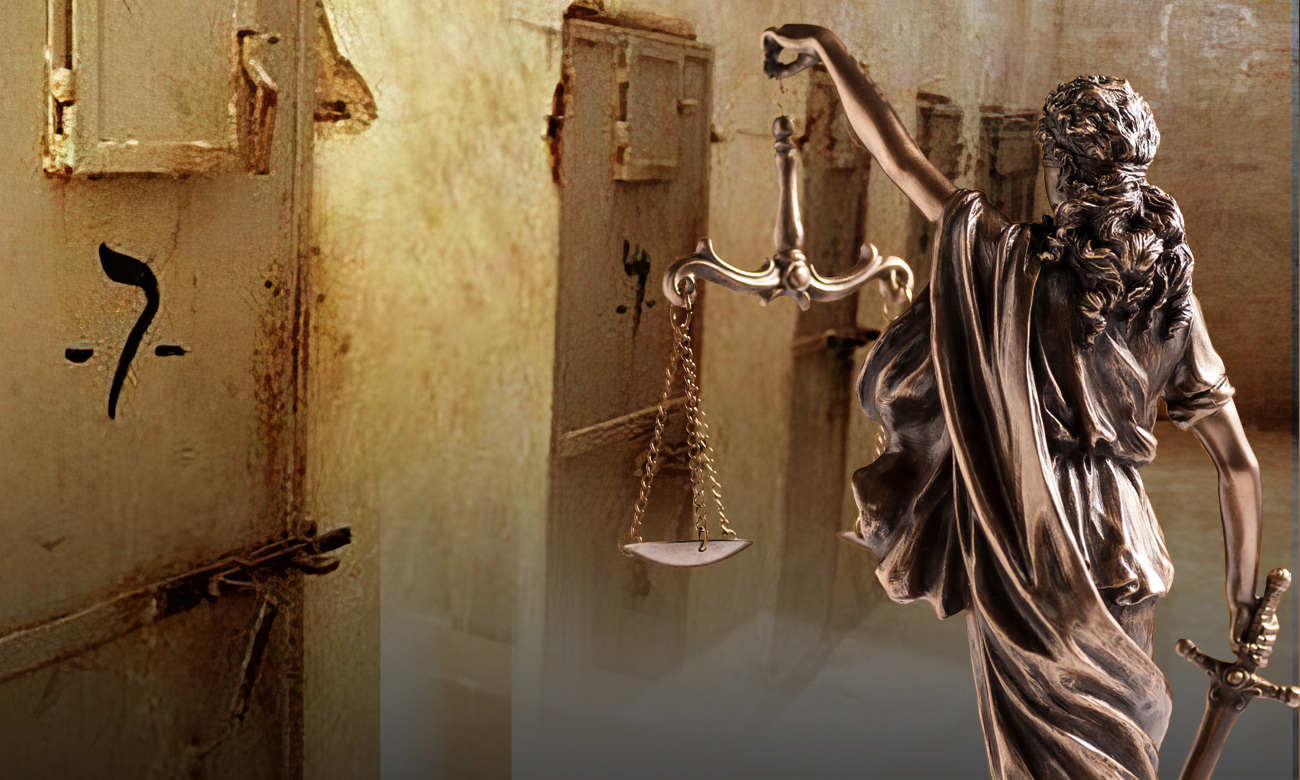
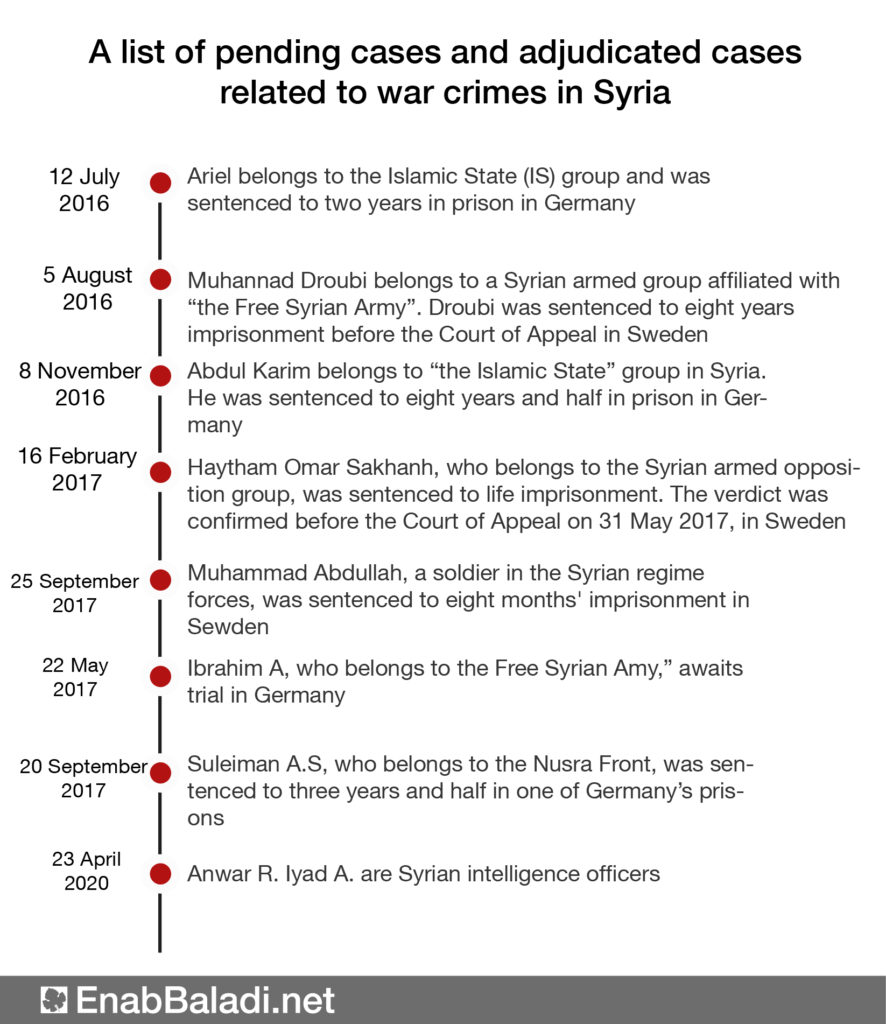


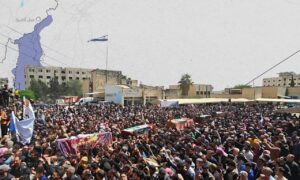




 More In-Depth
More In-Depth